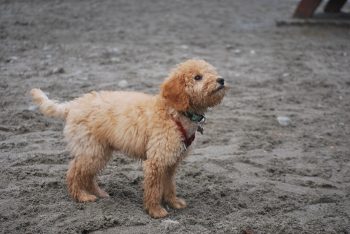Goldendoodles, a popular crossbreed known for their intelligence, playful personality, and affectionate nature, are usually not fussy eaters. However, there can be times when your Goldendoodle may lack interest in eating. This can concern owners, as proper nutrition is crucial for their health. This comprehensive guide delves into why a Goldendoodle might not be eating and provides guidelines on when to consult a veterinarian.
Understanding Goldendoodles’ Eating Habits
Goldendoodles are generally enthusiastic eaters, reflecting their Golden Retriever and Poodle lineage. A deviation from their standard eating patterns can be a significant sign that something is amiss, whether health-related or behavioral. Recognizing their typical eating habits is essential to identify any unusual changes effectively.
Common Reasons for Loss of Appetite in Goldendoodles
Several factors can contribute to a loss of appetite in Goldendoodles. Identifying these reasons can help in addressing the issue:
Stress and Environmental Changes: Goldendoodles can be sensitive to environmental or routine changes. Relocating, traveling, or any significant change in their daily routine can lead to stress and affect their eating habits.
Dental and Oral Health Issues: Dental problems, such as gum disease, tooth decay, or injuries in the mouth, can make eating painful, resulting in a decreased appetite. Regular dental check-ups are essential for preventing such issues.
Health Concerns: Various health issues, from minor conditions like an upset stomach or allergies to more severe illnesses like diabetes or kidney disease, can cause a Goldendoodle to lose its appetite. Other symptoms to watch for include vomiting, diarrhea, or changes in behavior.
Dietary Preferences and Food Quality: Goldendoodles might have specific dietary preferences. Disliking a particular type of food or being of low quality could be reasons for not eating.
When to Seek Veterinary Attention
It’s essential to know when to seek professional veterinary advice:
Prolonged Refusal to Eat: If your Goldendoodle refuses to eat for more than 48 hours, it’s advisable to consult a veterinarian.
Accompanying Symptoms of Illness: Loss of appetite and other symptoms such as vomiting, diarrhea, noticeable weight loss, or lethargy require immediate veterinary attention.
Pre-existing Health Conditions: Goldendoodles with pre-existing health conditions require immediate care if they show a significant change in appetite, which could indicate a complication or worsening of their disease.
Dietary Management and Care for Goldendoodles
Consistent Feeding Routine: Maintaining a regular feeding schedule in a familiar environment can help minimize stress and encourage your Goldendoodle to eat.
High-Quality Diet: Providing a balanced diet that fulfills the nutritional needs of your Goldendoodle is crucial. Introducing a new brand or type of food under veterinary guidance can stimulate their appetite.
Monitoring Dental Health: Regular dental care is essential. Dental issues can significantly affect a Goldendoodle’s eating ability, so maintaining good oral hygiene is vital for preventing such problems.
A Goldendoodle not eating can signify various issues, ranging from minor to severe. By understanding the potential reasons behind this behavior and recognizing when to seek veterinary help, you can ensure the health and happiness of your beloved pet. Regularly monitoring their eating habits and providing a nurturing environment and proper care are critical to encouraging a healthy appetite.
Tips for Getting Your Goldendoodle to Eat
The post Why is My Goldendoodle Not Eating? appeared first on iHeartDogs.com.

